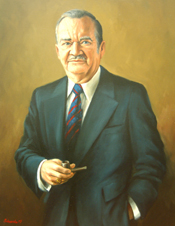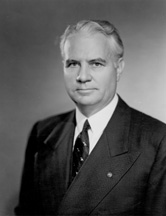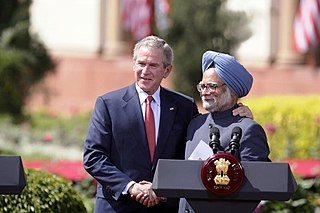
The politics of Russia take place in the framework of the federal semi-presidential republic of Russia. According to the Constitution of Russia, the President of Russia is head of state, and of a multi-party system with executive power exercised by the government, headed by the Prime Minister, who is appointed by the President with the parliament's approval. Legislative power is vested in the two houses of the Federal Assembly of the Russian Federation, while the President and the government issue numerous legally binding by-laws. Since the collapse of the Soviet Union at the end of 1991, Russia has seen serious challenges in its efforts to forge a political system to follow nearly seventy-five years of Soviet governance. For instance, leading figures in the legislative and executive branches have put forth opposing views of Russia's political direction and the governmental instruments that should be used to follow it. That conflict reached a climax in September and October 1993, when President Boris Yeltsin used military force to dissolve the parliament and called for new legislative elections. This event marked the end of Russia's first constitutional period, which was defined by the much-amended constitution adopted by the Supreme Soviet of the Russian Soviet Federative Socialist Republic in 1978. A new constitution, creating a strong presidency, was approved by referendum in December 1993.

The United States Department of State (DOS), or simply the State Department, is an executive department of the U.S. federal government responsible for the country's foreign policy and relations. Equivalent to the ministry of foreign affairs of other nations, its primary duties are advising the U.S. president on international relations, administering diplomatic missions, negotiating international treaties and agreements, and representing the U.S. at the United Nations. The department is headquartered in the Harry S Truman Building, a few blocks from the White House, in the Foggy Bottom neighborhood of Washington, D.C.; "Foggy Bottom" is thus sometimes used as a metonym.

The Taiwan Relations Act is an act of the United States Congress. Since the formal recognition of the People's Republic of China, the Act has defined the officially substantial but non-diplomatic relations between the US and Taiwan.
Ratification is a principal's legal confirmation of an act of its agent. In international law, ratification is the process by which a state declares its consent to be bound to a treaty. In the case of bilateral treaties, ratification is usually accomplished by exchanging the requisite instruments, and in the case of multilateral treaties, the usual procedure is for the depositary to collect the ratifications of all states, keeping all parties informed of the situation.
An executive agreement is an agreement between the heads of government of two or more nations that has not been ratified by the legislature as treaties are ratified. Executive agreements are considered politically binding to distinguish them from treaties which are legally binding.

Clement John Zablocki was an American politician who served nearly 35 years in the United States House of Representatives, representing Wisconsin's 4th congressional district.
The powers of the president of the United States include those explicitly granted by Article II of the United States Constitution as well as those granted by Acts of Congress, implied powers, and also a great deal of soft power that is attached to the presidency.

The Bricker Amendment is the collective name of a number of slightly different proposed amendments to the United States Constitution considered by the United States Senate in the 1950s. None of these amendments ever passed Congress. Each of them would require explicit congressional approval, especially for executive agreements that did not require the Senate's two-thirds approval for treaty. They are named for their sponsor, conservative Republican Senator John W. Bricker of Ohio, who distrusted the exclusive powers of the president to involve the United States beyond the wishes of Congress.

The Department of Foreign Affairs is the executive department of the Philippine government tasked to contribute to the enhancement of national security, protection of the territorial integrity and national sovereignty, to participate in the national endeavor of sustaining development and enhancing the Philippines' competitive edge, to protect the rights and promote the welfare of Filipinos overseas and to mobilize them as partners in national development, to project a positive image of the Philippines, and to increase international understanding of Philippine culture for mutually-beneficial relations with other countries.

The International Religious Freedom Act of 1998 was passed to promote religious freedom as a foreign policy of the United States, to promote greater religious freedom in countries which engage in or tolerate violations of religious freedom, and to advocate on the behalf of individuals persecuted for their religious beliefs and activities in foreign countries. The Act was signed into law by President Bill Clinton on October 27, 1998. Three cooperative entities have been maintained by this act to monitor religious persecution.
- An Ambassador-at-Large for International Religious Freedom within the Department of State, who is the highest-ranking US diplomat on international religious freedom, and who is tasked with carrying out the provisions of IRFA: the Annual Report, negotiations with foreign governments to bring about greater religious freedom, and the determination of Countries of Particular Concern (CPC's) under IRFA, which entails further actions.
- A bipartisan United States Commission on International Religious Freedom, designed to provide independent policy recommendations and fact-finding, and
- A Special Adviser on International Religious Freedom within the National Security Council.

The 123 Agreement signed between the United States of America and the Republic of India is known as the U.S.–India Civil Nuclear Agreement or Indo-US nuclear deal. The framework for this agreement was a July 18, 2005, joint statement by then Indian Prime Minister Manmohan Singh and then U.S. President George W. Bush, under which India agreed to separate its civil and military nuclear facilities and to place all its civil nuclear facilities under International Atomic Energy Agency (IAEA) safeguards and, in exchange, the United States agreed to work toward full civil nuclear cooperation with India. This U.S.-India deal took more than three years to come to fruition as it had to go through several complex stages, including amendment of U.S. domestic law, especially the Atomic Energy Act of 1954, a civil-military nuclear Separation Plan in India, an India-IAEA safeguards (inspections) agreement and the grant of an exemption for India by the Nuclear Suppliers Group, an export-control cartel that had been formed mainly in response to India's first nuclear test in 1974. In its final shape, the deal places under permanent safeguards those nuclear facilities that India has identified as "civil" and permits broad civil nuclear cooperation, while excluding the transfer of "sensitive" equipment and technologies, including civil enrichment and reprocessing items even under IAEA safeguards. On August 18, 2008, the IAEA Board of Governors approved, and on February 2, 2009, India signed an India-specific safeguards agreement with the IAEA. After India brought this agreement into force, inspections began in a phased manner on the 35 civilian nuclear installations India has identified in its Separation Plan. The deal is seen as a watershed in U.S.-India relations and introduces a new aspect to international nonproliferation efforts. On August 1, 2008, the IAEA approved the safeguards agreement with India, after which the United States approached the Nuclear Suppliers Group (NSG) to grant a waiver to India to commence civilian nuclear trade. The 48-nation NSG granted the waiver to India on September 6, 2008, allowing it to access civilian nuclear technology and fuel from other countries. The implementation of this waiver made India the only known country with nuclear weapons which is not a party to the Non-Proliferation Treaty (NPT) but is still allowed to carry out nuclear commerce with the rest of the world.

The Jerusalem Embassy Act of 1995 is a public law of the United States passed by the 104th Congress on October 23, 1995. The proposed law was adopted by the Senate (93–5), and the House (374–37). The Act became law without a presidential signature on November 8, 1995.
The fast track authority for brokering trade agreements is the authority of the President of the United States to negotiate international agreements in an expedited manner and with limited congressional oversight. Renamed the trade promotion authority (TPA) in 2002, the TPA is an impermanent power granted by Congress to the President. It remained in effect from 1975 to 1994, pursuant to the Trade Act of 1974 and from 2002 to 2007 pursuant to the Trade Act of 2002. Although it technically expired in July 2007, it remained in effect for agreements that were already under negotiation until their passage in 2011. In June 2015, a third renewal passed Congress and was signed into law by President Barack Obama.
The Treaty Clause of the United States Constitution establishes the procedure for ratifying international agreements. It empowers the President as the primary negotiator of agreements between the United States and other countries, and holds that the advice and consent of a two-thirds supermajority of the Senate renders a treaty binding with the force of federal law.
Executive Order 12036 is a United States Presidential Executive Order signed on January 24, 1978, by President Jimmy Carter that imposed restrictions on and reformed the U.S. Intelligence Community along with further banning indirect U.S. involvement in assassinations. The EO was designed to strengthen and expand Executive Order 11905, which was originally signed by Gerald R. Ford in 1976.
A filibuster is a tactic used in the United States Senate to delay or block a vote on a measure by preventing debate on it from ending. The Senate's rules place few restrictions on debate; in general, if no other senator is speaking, a senator who seeks recognition is entitled to speak for as long as they wish. Only when debate concludes can the measure be put to a vote.

Nuclear Non-Proliferation Act of 1978, 22 U.S.C. § 3201, is a United States federal law declaring that nuclear explosive devices pose a perilous threat to the security interests of the United States and continued international progress towards world peace and the development of nations.

The Joint Comprehensive Plan of Action, commonly known as the Iran nuclear deal or Iran deal, is an agreement on the Iranian nuclear program reached in Vienna on 14 July 2015, between Iran and the P5+1 together with the European Union.

The following is a timeline of the presidency of Jimmy Carter, from January 1, 1978, to December 31, 1978.